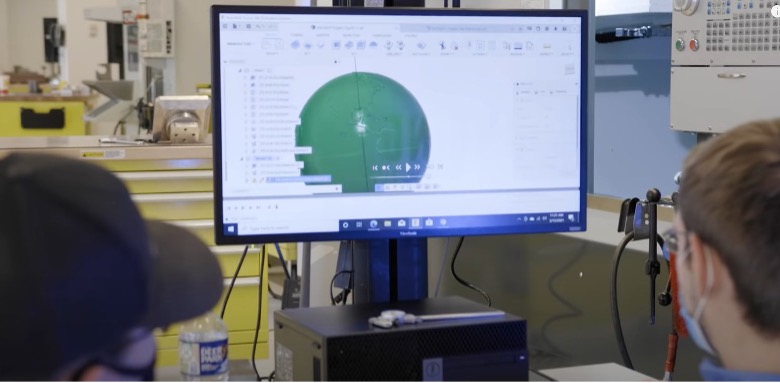
Danville Community College (DCC), in the Virginian town of 41,000 people, is altering the perception of two-year colleges—one student at a time. The reality of skyrocketing tuitions at four-year universities has caused students to rethink their academic futures. Community colleges like Danville are resurfacing as excellent alternatives to the traditional, and expensive, four-year university track. And DCC is taking it a step further, aiming to reinvent how manufacturing is taught and adopt a hands-on approach to learning.
The town of Danville, which sits just above the Virginia–North Carolina border, has a long history in the manufacturing industry that has evolved over time. The traditional manufacturing processes that once fueled the town’s economy have faded away over the years, and the academic community at DCC has committed to reviving and reinventing what manufacturing could look like. Students across the country are showing keen interest—not only in two-year colleges as an alternative to four-year programs, but also in manufacturing as an innovative and lucrative career path. By incorporating advanced manufacturing and hands-on learning into the curriculum, DCC has evolved into a thought leader in manufacturing academia and getting students to learn by doing.
Clash of Trades win
Nowhere is this more evident than in Danville’s latest win at Project MFG’s Clash of Trades National Championship. A team of DCC students stole the show in April of this year by beating out more than 100 individual competitors from eight states, showcasing their design and innovation prowess.
Project MFG—supported by the US Department of Defense Industrial Base Analysis and Sustainment (IBAS) program—hosts a variety of competitions in the hopes of encouraging innovation in the manufacturing industry. Project MFG’s latest competition, “Clash of Trades,” challenged its participants to design their own trophy using advanced manufacturing capabilities. Students Koby Carter, Trent Oswald, and Chase Smith teamed up to represent DCC and ended up with the national championship win, not to mention $35,000 in prize money. With three other participating teams using competitive software for their designs, the Danville team set themselves apart by designing in Autodesk® Fusion 360® software.
Jeremiah Williams, director of Integrated Machining Technology at DCC, has supported the team’s use of Fusion 360 from day one. “Due to the simplicity of Fusion 360, training students to learn CAD/CAM software becomes much different than typical training for competitor software. I spend much less time teaching and answering questions on interface navigation and spend a majority of my time teaching students how to use Fusion 360 at a very advanced level. I think the combination of simple user interfaces, excellent toolpath generation, and the ability to make major changes quickly is what allowed the DCC team to come out on top.”

What sets DCC apart?
The academic community at DCC believes that the earlier people begin designing and making in the engineering world, the better. That’s why students as early as sixth grade learn Fusion 360 to jumpstart their manufacturing education. And through dual enrollment, high school students can complete their first year of machining during their junior and senior years, earning college credits. Those interested in advancing their manufacturing skills can participate in a capstone project at DCC’s Gene Haas Center for Integrated Machining, one of only four teacher training centers in the country. In this 32-week program, approximately 20 students train on advanced machines to hone their manufacturing expertise. DCC’s two-year precision machining program offers students the opportunity to learn on machines such as manual mill/lathe, CNC mill/lathe, surface grinders, bench inspection, coordinate-measuring machine (CMM) inspection, CAD/CAM, and a variety of other important hand tools. Advanced students will be introduced to wire/sinker electrical discharge machining (EDM), 5-axis simultaneous, dual-spindle lathe with live tooling, CNC grinders, tool presetters, machine probing, and statistical process control (SPC) data collection software. Students can learn not only the hard skills that help them earn leadership positions as operators, machinists, engineers, technicians, and inspectors, but also the soft skills to help them excel interpersonally, like industrial leadership and business communication.
Why Fusion 360?
Educators at Danville Community College currently teach Autodesk® Fusion 360® technology to middle schoolers, college students, and everyone in between with the aim of invoking a spirit of manufacturing innovation and lifelong learning. With Fusion 360, faculty at DCC can offer the full spectrum of multidisciplinary workflows, including CAD, CAM, CAE, and even printed circuit board (PCB) functionality, all in an intuitive and easy-to-use cloud-based platform so that students focus less on learning complicated software and more on growing their skill base.
Students like Koby, Trent, and Chase are just a handful of many hungry learners looking for ways to gain a technical education and apply their ingenuity through design and engineering. Fortunately, engineering programs like the one at Danville Community College are leading today’s generation of students by teaching them the building blocks of innovation through hands-on technical learning and career readiness, shaping the future of education in the process.